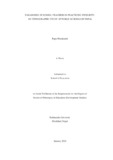
Please use this identifier to cite or link to this item:
https://hdl.handle.net/20.500.14301/367| Title: | Paradoxes of School Teachers in Practicing Integrity: An Ethnographic Study of Public Schools of Nepal. |
| Authors: | Munakarmi, Rupa |
| Citation: | Munakarmi,R.(2024).Paradoxes of school teachers in practicing integrity: an ethnographic study of public schools of Nepal. |
| Issue Date: | Jan-2024 |
| Publisher: | Kathmandu University School of Education |
| School: | SOED |
| Department: | DODE |
| Level: | Ph.D. |
| Program: | PhD in Development Education |
| Abstract: | Integrity is a complex and multifaceted concept that can vary depending on the cultural and social context in which it is understood and applied. It is crucial in education as it serves as a moral and motivational force and encourages individuals to think, act, and behave ethically and positively. Promoting and maintaining teachers' integrity is important for educational institutions, as it enhances the overall quality of education. Teachers are expected to have strong integrity and uphold ethical standards to create a positive learning environment, as they can inspire students and community people to act with integrity. As such, the purpose of this study is to explore the understanding of integrity among public schoolteachers in their workplace and how they practice it. Additionally, it aims to identify any paradoxes that arise when teachers encounter differences between their understanding and their practice of integrity. This study unveils teachers' integrity based on fieldwork conducted between 2016 and 2018 and additional random visits to the study area in semi-urban and rural parts of the Kavre District. The study used socio-capital and socio-cultural theoretical lenses to comprehend teachers' integrity. I employed the meaning-making process to construct meanings collaboratively with my participants, which allowed me to gain a deeper understanding of their perspectives and experiences related to what integrity means. I conducted interviews and observations and worked together to develop a shared understanding of the concept of integrity and how it relates to their work. The study revealed that a teacher's understanding of integrity is a complex and multifaceted concept shaped by individual, cultural, institutional, and social aspects. Acknowledging teachers' diverse perspectives about their integrity was important because it ultimately impacted how they interpret and apply it in their teaching. It was essential to consider institutional context, socio-cultural context, and challenges from changes in the social, economic, and political landscape to understand the practices of teachers' integrity. Teachers in public schools emphasize the five essential values of integrity: time, task, transparency, trust, and teamwork. By emphasizing and prioritizing these values, teachers helped establish an environment where integrity is valued and encouraged in the school. Integrity was understood and practiced differently depending on the setting. The prevailing culture shaped how teachers understand, follow, and prioritize integrity in schools. Teachers with a strong sense of agency were more likely to adapt to the school context, enabling them to generate creative solutions when faced with challenges. Teachers with a strong sense of agency were better at creatively addressing the challenges they encountered. This adaptability benefited both their personal growth and the school's overall environment. The study showed a paradox between legal positivism and being proactive in schools. Maintaining proactive integrity can sometimes break legal positivist principles. Teachers try to find a balance between these two approaches when talking about integrity. |
| URI: | https://hdl.handle.net/20.500.14301/367 |
| Appears in Collections: | Theses |
Files in This Item:
| File | Description | Size | Format | |
|---|---|---|---|---|
| Rupa Munankarmi Final Thesis.pdf | 1.2 MB | Adobe PDF |  View/Open |
Items in DSpace are protected by copyright, with all rights reserved, unless otherwise indicated.